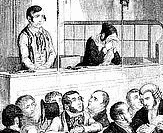 While we tend to think that the recognition of false confessions is a relatively new development but The Lancet discussed the phenomenon of ‘auto-accusation’ as far back as 1902.
While we tend to think that the recognition of false confessions is a relatively new development but The Lancet discussed the phenomenon of ‘auto-accusation’ as far back as 1902.
The article discusses the types of people falsely confessing to notorious crimes in early 1900s Paris.
“Auto-accusation” is a curious phenomenon which possesses both medical and legal interest. The committal of a notorious crime which excites popular imagination and which remains undetected for a time often leads to the appearance in law courts of self-accusing culprits who charge themselves with being the authors of the crime in question. Dr. Ernest Dupr√© of Paris in a paper read before the Annual Congress of French Alienists and Neurologists recently held at Grenoble attempts to delineate with exactitude the psychological nature of “auto-accusation” and to show that certain morbid elements play an important part in it.
He points out that “auto-accusation” is not often or merely the result of a weak-mindedness; the subject of it is a person who has positively developed general ideas of unworthiness, guilt, and remorse, and in a word is suffering from mild melancholia with vague delusions of guilt and sin. Another type of self-accuser is the proud and vain “degenerate” who with a brain warped by congenital anomaly of development constructs romances of which he readily persuades himself to be the hero or the martyr.
There is, adds Dr. Dupré, a marked contrast between these two types. The one is abject, lowly, self-humiliating; the other proud, egiostic, and vain. Among other types of the same abnormality are found persons of alcoholic or hysterical character. The alcoholic self-accuser is one whose delusion generally has its starting-point in nocturnal or morning hallucinations occurring in a state between sleeping and waking. The physical and mental characters associated with alcoholism permit such cases to be readily recognised and they are almost invariably observed in adult males. The female self-accuser is rarely seen in the law court and she is usually the subject of a marked hysteria.
These would now both be described as ‘voluntary’ false confessions, which can involve both people who are looking for notoriety and those who may believe they are responsible owing to mental health problems impairing the ability to make sense of reality.
These are in contrast to a ‘coerced-compliant’ confession – where someone knows that they’re innocent but takes the rap for whatever reason, and a ‘coerced-internalised’ confession, which can result from the accused starting to doubt their own memory and judgement and start to believe they were responsible, often due in part to high pressure interviewing techniques.
The piece was found via the occasional ‘100 years ago’ section of the British Journal of Psychiatry that picks out interesting items from a century hence.
Link to original article in The Lancet.